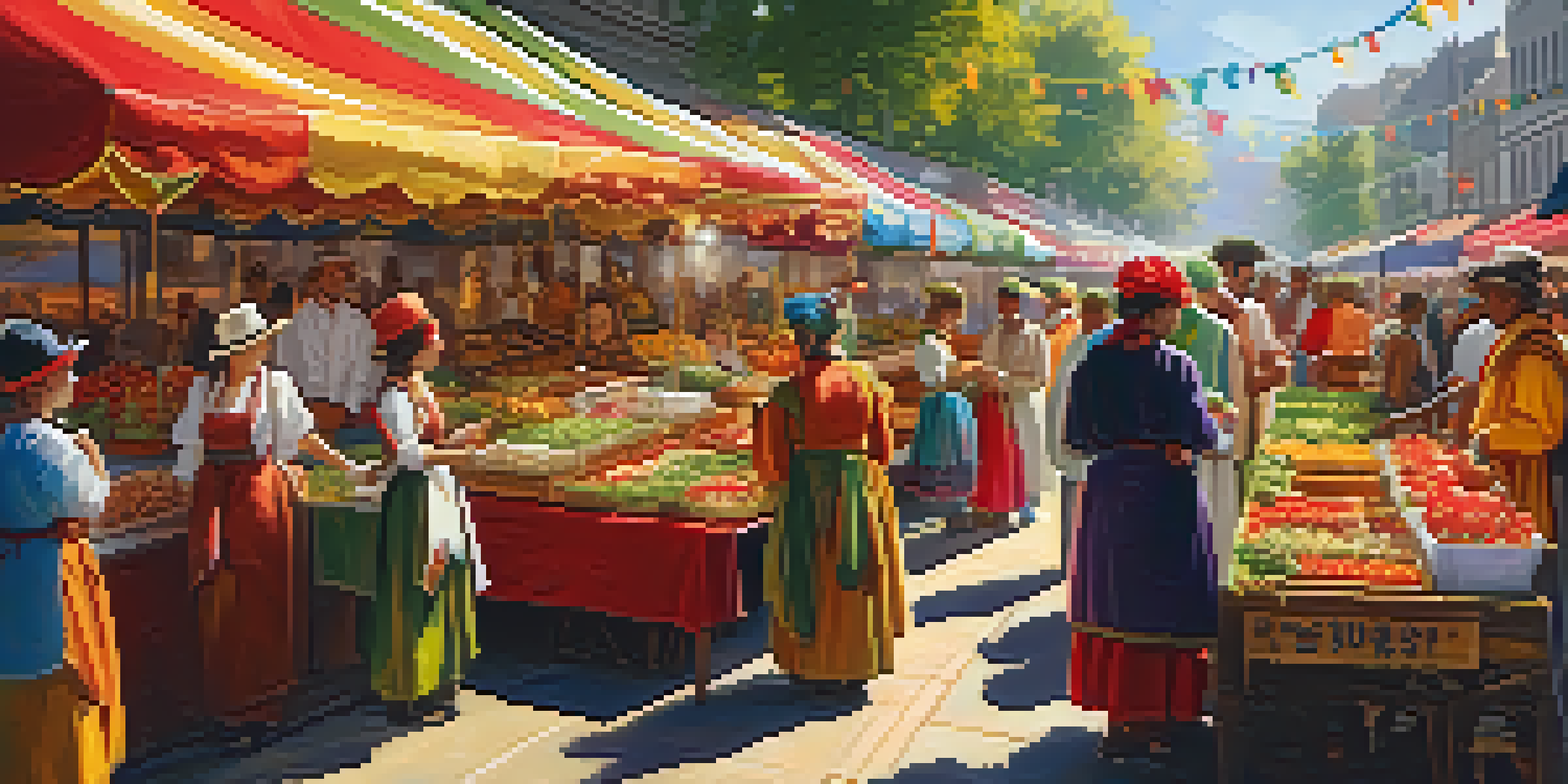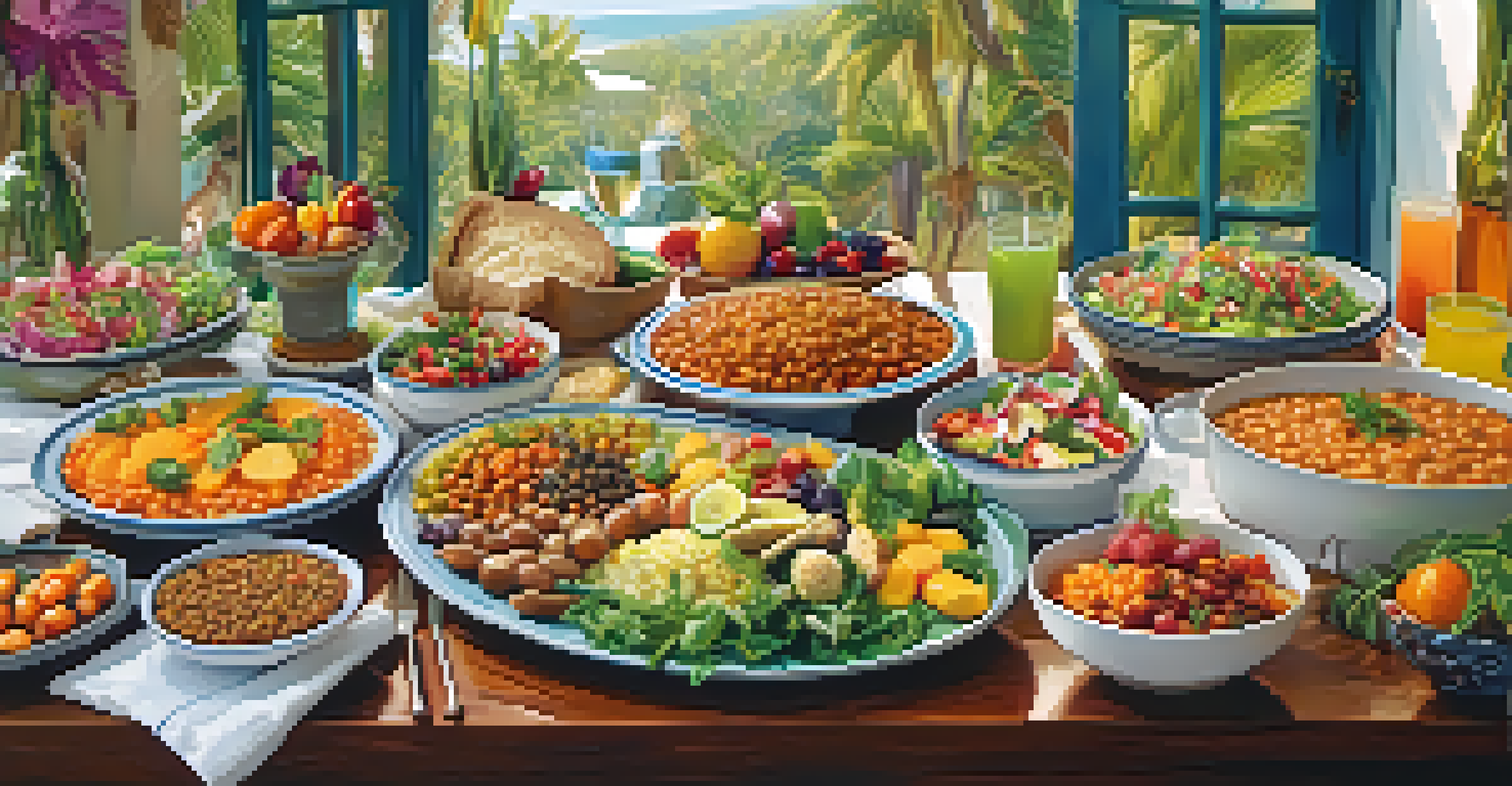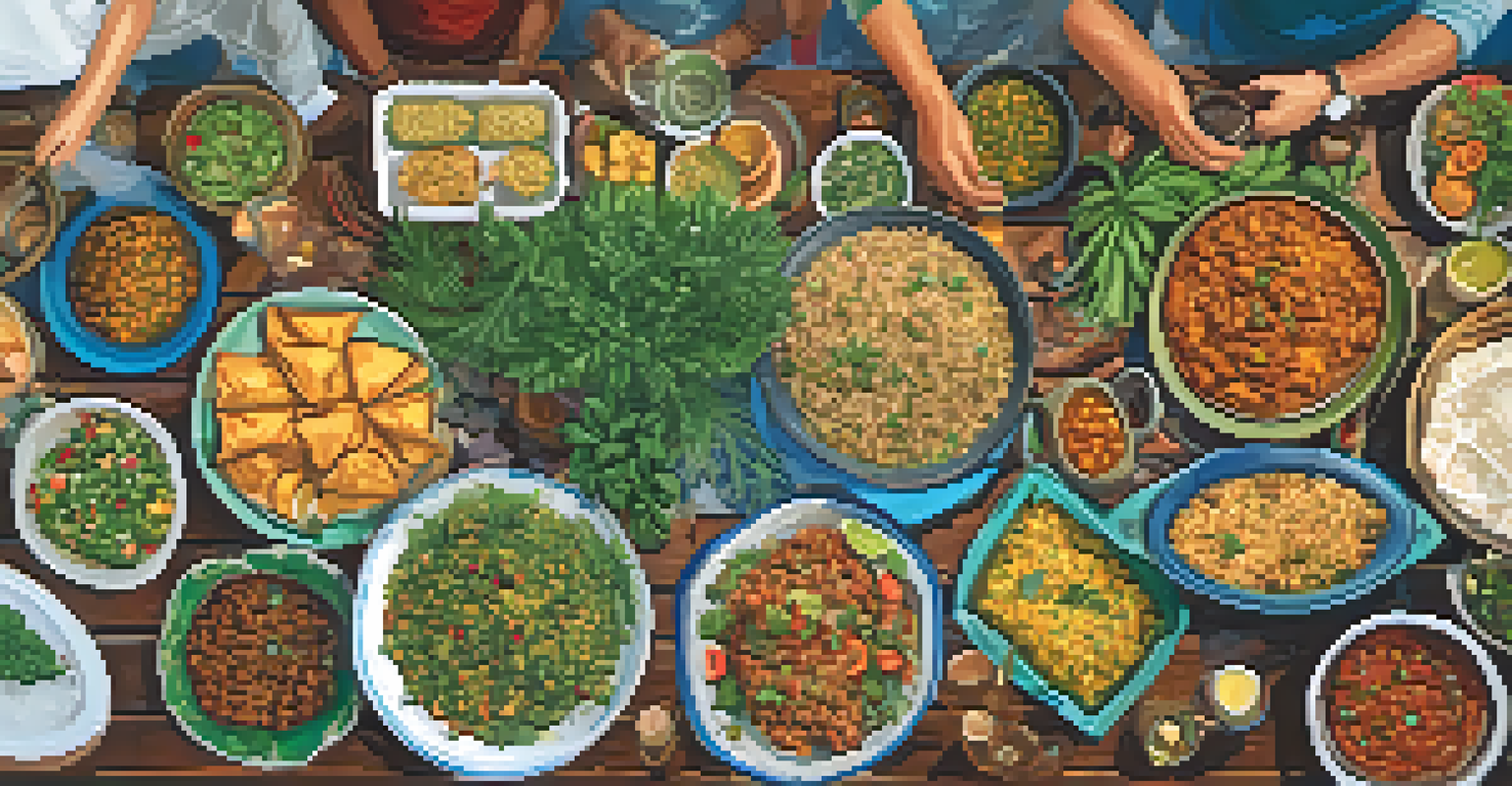Carnival and Vegetarianism: A Celebration of Plant-Based Food

The Colorful Origins of Carnival and Its Culinary Richness
Carnival is a vibrant festival celebrated around the world, marked by parades, music, and, of course, food. Originating from a mix of cultural traditions, it often highlights local cuisines, including a wide array of plant-based dishes. The festival's roots in pre-Lenten celebrations mean that food plays a central role, showcasing everything from savory to sweet delights.
Food is not just what we eat; it’s a reflection of our culture, values, and creativity.
As communities come together to celebrate, they often embrace the bounty of local produce, creating dishes that reflect their heritage and creativity. This emphasis on fresh, seasonal vegetables and fruits not only enhances the flavor but also promotes sustainability. It's fascinating how this festival allows people to indulge while still honoring the earth by choosing plant-based options.
In many regions, vegetarian dishes have become a staple during Carnival, showcasing the diversity of plant-based cuisine. From hearty stews to sweet pastries, these dishes reflect the multicultural influences that shape the celebration. So, whether you're wandering through the streets of Rio or indulging in New Orleans, you'll find a delightful array of vegetarian treats waiting to be enjoyed.
Plant-Based Delicacies: A Feast for the Senses
One of the most exciting aspects of Carnival is the variety of plant-based delicacies that grace the tables. Think about colorful salads bursting with fresh vegetables, or vibrant fruit platters that are as pleasing to the eye as they are to the palate. These dishes not only celebrate the flavors of the season but also reflect the creativity of chefs and home cooks alike.

For example, in Trinidad, you might find 'callaloo,' a rich, green stew made from leafy greens, often served with rice. In Brazil, the famous 'feijoada' can be adapted to a vegetarian version, filled with black beans and a mix of vegetables that still deliver the same comforting feel. These dishes highlight how plant-based eating can be both satisfying and celebratory.
Carnival Celebrates Plant-Based Cuisine
The festival showcases a rich variety of vegetarian dishes that reflect local cultures and traditions.
Moreover, the use of spices and herbs in these recipes elevates the taste experience, making vegetarian dishes just as indulgent as their meat-based counterparts. This culinary creativity not only pleases the palate but also encourages more people to explore plant-based options, proving that vegetarian food can be a true celebration of flavors during Carnival.
Cultural Significance of Vegetarianism in Carnival
The embrace of vegetarianism during Carnival is not just about food; it's deeply rooted in cultural practices and beliefs. Many cultures celebrate the festival as a time of renewal and purification, where the choice of plant-based foods aligns with the values of health and wellbeing. By consuming more vegetables and fruits, participants honor the spirit of the festival.
Eating is an agricultural act; we are what we eat and how we eat shapes our communities.
In some regions, certain religions and traditions encourage vegetarianism during Carnival as a means of spiritual reflection. This practice underscores the idea that what we eat can be a form of worship or respect for nature. It’s a beautiful reminder that our food choices can be intertwined with our beliefs and the cultural narratives we hold dear.
Furthermore, the communal aspect of Carnival fosters a sense of togetherness, where families and friends gather to share meals. This collective experience creates a space for celebrating not only the food but also the values of compassion and sustainability that often accompany vegetarianism. In this way, Carnival becomes a joyful celebration of both culture and conscious eating.
Sustainable Practices in Carnival Food Preparation
Sustainability is a growing concern in today's world, and Carnival provides a unique opportunity to highlight eco-friendly practices, especially in food preparation. Many Carnival celebrations now prioritize locally sourced vegetables and fruits, reducing the carbon footprint associated with food transport. This focus on local produce not only supports farmers but also enhances the freshness of the dishes served.
Additionally, many chefs and home cooks are embracing zero-waste cooking techniques during Carnival. This means using every part of the vegetable, from root to leaf, ensuring that nothing goes to waste. Such practices resonate with the festival's spirit of abundance while promoting a more sustainable approach to food consumption.
Sustainability in Carnival Practices
Carnival emphasizes eco-friendly food preparation, focusing on local produce and zero-waste cooking techniques.
By incorporating sustainability into their culinary practices, Carnival participants can enjoy delicious meals while being mindful of their impact on the environment. This shift not only enriches the festival experience but also encourages a broader audience to consider these practices in their everyday lives, fostering a movement towards more responsible eating.
Incorporating Global Vegetarian Influences
Carnival is a melting pot of cultures, and this diversity is beautifully reflected in the range of vegetarian dishes on offer. From Caribbean-inspired lentil stews to Asian-style vegetable dumplings, the festival showcases a fusion of flavors that cater to various palates. This global influence encourages people to explore new cuisines and appreciate the richness of vegetarian food.
For instance, many Carnival celebrations have adopted Indian-inspired dishes, such as samosas filled with spiced potatoes and peas, offering a crunchy contrast to the softer textures often found in traditional Carnival fare. Similarly, Mediterranean dishes like tabbouleh or baba ghanoush have made their way into the festivities, bringing fresh herbs and vibrant flavors to the table.
This blending of culinary traditions not only enriches the festival experience but also fosters a greater appreciation for plant-based eating. As people sample these diverse dishes, they are likely to discover new favorites, further encouraging a shift towards vegetarianism beyond the Carnival season.
Celebrating Community Through Vegetarian Meals
At the heart of Carnival is community, and what better way to celebrate togetherness than through shared meals? Vegetarian dishes often lend themselves to communal dining, allowing friends and families to gather around the table and enjoy a variety of flavors. This aspect of Carnival emphasizes the joy of eating as a collective experience, rather than just an individual one.
Potluck-style gatherings, where everyone brings a plant-based dish to share, have become increasingly popular during Carnival. This not only fosters a sense of belonging but also encourages culinary creativity as participants experiment with their favorite recipes. The excitement of trying new dishes made by friends adds an extra layer of connection to the celebration.
Community Bonded Through Shared Meals
Vegetarian meals during Carnival foster communal dining experiences, encouraging creativity and connection among participants.
Moreover, these communal meals can serve as a platform to discuss the benefits of vegetarianism, sparking conversations about health, sustainability, and animal welfare. By enjoying and sharing plant-based meals, Carnival-goers can inspire each other to embrace a more conscious approach to eating, making the festival not just a celebration of food, but a celebration of values and community.
The Future of Vegetarianism in Carnival Celebrations
As the world evolves, so too does the way we celebrate traditions like Carnival. The rise of vegetarianism, driven by health trends and environmental concerns, is likely to become even more prominent in future celebrations. This shift presents an exciting opportunity for Carnival to further embrace plant-based options, enticing new audiences to participate in the festivities.
Moreover, with more chefs and restaurants focusing on plant-based cuisine, the quality and creativity of vegetarian dishes will continue to improve. As these culinary innovations take center stage, they are bound to attract attention and admiration, proving that vegetarian food can be just as indulgent and festive as traditional fare. This evolution can help redefine the culinary landscape of Carnival.

Ultimately, the future of vegetarianism in Carnival celebrations looks promising. As more individuals recognize the benefits of plant-based eating, these vibrant festivals can continue to be a platform for showcasing delicious, sustainable food that brings people together. By celebrating vegetarianism, Carnival not only honors its rich traditions but also paves the way for a more inclusive, eco-conscious future.